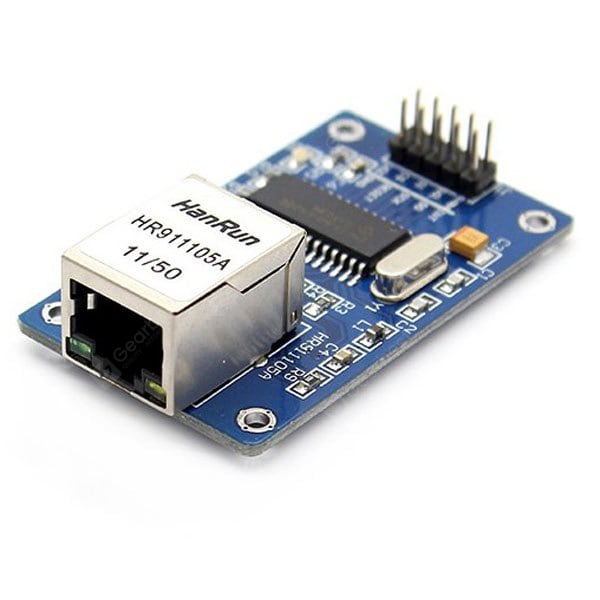Mbed library for ENC28J60 Ethernet modules. Full support for TCP/IP and UDP Server, Client and HTTP server (webserver). DHCP and DNS is included.
Dependents: mBuino_ENC28_MQTT Nucleo_Web_ENC28J60 Nucleo_Web_ENC28J60_ADC Serial_over_Ethernet ... more
Library for ENC28J60 Ethernet modules.

Ported to mbed from Norbert Truchsess's UIPEthernet library for Arduino. Thank you Norbert!
- Full support for persistent (streaming) TCP/IP and UDP connections Client and Server each, ARP, ICMP, DHCP and DNS.
- Works with both Mbed OS 2 and Mbed OS 5.
Usage:
- Import the library into your project.
- Add
#include "UipEthernet.h"tomain.cpp - Create one instance of the UipEthernet class initialized with the MAC address you'd like to use and SPI pins of the connected Mbed board.
Example programs:
Import programWebSwitch_ENC28J60
HTTP Server serving a simple webpage which enables to remotely turn a digital output on/off. Compile, download, run and type 'IP_address/secret/' (don't forget the last '/') into your web browser and hit ENTER.
Import programHTTPServer_Echo_ENC28J60
A simple HTTP server echoing received requests. Ethernet connection is over an ENC28J60 board. Usage: Type the server's IP address into you web browser and hit <ENTER>.
Import programTcpServer_ENC28J60
Simple TCP/IP Server using the UIPEthernet library for ENC28J60 Ethernet boards.
Import programTcpClient_ENC28J60
Simple TCP/IP Client using the UIPEthernet library for ENC28J60 Ethernet boards.
Import programUdpServer_ENC28J60
Simple UDP Server using the UIPEthernet library for ENC28J60 Ethernet boards.
Import programUdpClient_ENC28J60
Simple UDP Client using the UIPEthernet library for ENC28J60 Ethernet boards.
Import programMQTT_Hello_ENC28J60
MQTT Client example program. Ethernet connection is via an ENC28J60 module.
IpAddress.cpp
- Committer:
- hudakz
- Date:
- 2019-09-07
- Revision:
- 15:53715cc81c63
- Parent:
- 11:647d53d146f1
File content as of revision 15:53715cc81c63:
/*
IPAddress.cpp - Base class that provides IPAddress
Copyright (c) 2011 Adrian McEwen. All right reserved.
Modified (ported to mbed) by Zoltan Hudak <hudakz@inbox.com>
This library is free software; you can redistribute it and/or
modify it under the terms of the GNU Lesser General Public
License as published by the Free Software Foundation; either
version 2.1 of the License, or (at your option) any later version.
This library is distributed in the hope that it will be useful,
but WITHOUT ANY WARRANTY; without even the implied warranty of
MERCHANTABILITY or FITNESS FOR A PARTICULAR PURPOSE. See the GNU
Lesser General Public License for more details.
You should have received a copy of the GNU Lesser General Public
License along with this library; if not, write to the Free Software
Foundation, Inc., 51 Franklin St, Fifth Floor, Boston, MA 02110-1301 USA
*/
#include <stdio.h>
#include "mbed.h"
#include "IpAddress.h"
/**
* @brief
* @note
* @param
* @retval
*/
IpAddress::IpAddress(void)
{
memset(_address, 0, sizeof(_address));
}
/**
* @brief
* @note
* @param
* @retval
*/
IpAddress::IpAddress(uint8_t octet1, uint8_t octet2, uint8_t octet3, uint8_t octet4)
{
_address[0] = octet1;
_address[1] = octet2;
_address[2] = octet3;
_address[3] = octet4;
}
/**
* @brief
* @note
* @param
* @retval
*/
IpAddress::IpAddress(uint32_t address)
{
memcpy(_address, &address, sizeof(_address));
}
/**
* @brief
* @note
* @param
* @retval
*/
IpAddress::IpAddress(const uint8_t address[4])
{
memcpy(_address, address, sizeof(_address));
}
/**
* @brief
* @note
* @param
* @retval
*/
IpAddress::IpAddress(const char* str, size_t len)
{
uint8_t pos = 0;
uint8_t byte;
uint8_t i = 0;
if (len > 16)
return;
while (true) {
if (pos == len || str[pos] < '0' || str[pos] > '9') {
return;
}
byte = 0;
while (pos < len && str[pos] >= '0' && str[pos] <= '9') {
byte *= 10;
byte += str[pos++] - '0';
}
_address[i++] = byte;
if (i == 4) {
return;
}
if (pos == len || str[pos++] != '.') {
return;
}
}
}
/**
* @brief
* @note
* @param
* @retval
*/
IpAddress &IpAddress::operator=(const uint8_t* address) {
memcpy(_address, address, sizeof(_address));
return *this;
}
/**
* @brief
* @note
* @param
* @retval
*/
IpAddress &IpAddress::operator=(uint32_t address)
{
memcpy(_address, (const uint8_t*) &address, sizeof(_address));
return *this;
}
/**
* @brief
* @note
* @param
* @retval
*/
bool IpAddress::operator==(const uint8_t* addr) const
{
return memcmp(addr, _address, sizeof(_address)) == 0;
}
/**
* @brief Returns IP Address as string of char
* @note
* @param
* @retval
*/
const char* IpAddress::toString(char* buf)
{
uint8_t i = 0;
uint8_t j = 0;
for (i = 0; i < 3; i++) {
j += sprintf(&buf[j], "%d", _address[i]);
buf[j++] = '.';
}
j += sprintf(&buf[j], "%d", _address[i]);
buf[j] = '\0';
return buf;
}
